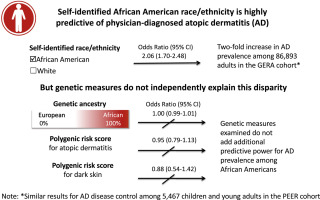当前位置:
X-MOL 学术
›
J. Allergy Clin. Immunol.
›
论文详情
Our official English website, www.x-mol.net, welcomes your
feedback! (Note: you will need to create a separate account there.)
Genetic ancestry does not explain increased atopic dermatitis susceptibility or worse disease control among African American subjects in 2 large US cohorts.
Journal of Allergy and Clinical Immunology ( IF 11.4 ) Pub Date : 2019-07-29 , DOI: 10.1016/j.jaci.2019.06.044 Katrina Abuabara 1 , Yue You 2 , David J Margolis 3 , Thomas J Hoffmann 4 , Neil Risch 5 , Eric Jorgenson 6
Journal of Allergy and Clinical Immunology ( IF 11.4 ) Pub Date : 2019-07-29 , DOI: 10.1016/j.jaci.2019.06.044 Katrina Abuabara 1 , Yue You 2 , David J Margolis 3 , Thomas J Hoffmann 4 , Neil Risch 5 , Eric Jorgenson 6
Affiliation

|
BACKGROUND
Atopic dermatitis (AD) is more common among African American children. Whether there are racial/ethnic difference among adults with AD and the causes for those disparities are unclear.
OBJECTIVE
We sought to examine the relationship between self-reported race/ethnicity and AD and determine whether African genetic ancestry is predictive of these outcomes among African American subjects.
METHODS
We analyzed data from 2 independent multiethnic longitudinal studies: 86,893 subjects aged 18 to 100 years from the Kaiser Permanente Genetic Epidemiology Research on Adult Health and Aging (GERA) cohort and 5467 subjects aged 2 to 26 years from the national Pediatric Eczema Elective Registry (PEER) cohort. The primary outcomes were physician-diagnosed AD in GERA and repeated measures of self-reported disease control among patients with physician-diagnosed AD at 6-month intervals in PEER. We examined whether self-identified African American race/ethnicity was predictive of these outcomes and then tested whether a continuous measure of African genetic ancestry was associated with outcomes within the African American group.
RESULTS
AD was more common among self-identified African American subjects than non-Hispanic white subjects in GERA (4.4% vs 2.1%; odds ratio, 2.06; 95% CI, 1.70-2.48) and less well-controlled in PEER subjects (odds of 1-level worse control, 1.91; 95% CI, 1.64-2.22). However, African genetic ancestry was not associated with AD risk or control among self-identified African American subjects in either cohort, nor did an AD polygenic risk score or genetic skin pigment score explain the AD disparities in patients with AD.
CONCLUSION
Ancestry-related genetic effects do not explain increased AD prevalence or poorer disease control among African American subjects.
中文翻译:

遗传血统并不能解释美国两个大型队列中非裔美国人受试者特应性皮炎易感性增加或疾病控制较差的原因。
背景特应性皮炎(AD)在非裔美国儿童中更为常见。成人 AD 患者是否存在种族/民族差异以及造成这些差异的原因尚不清楚。目的 我们试图研究自我报告的种族/民族与 AD 之间的关系,并确定非洲遗传血统是否可以预测非裔美国受试者的这些结果。方法 我们分析了 2 项独立的多种族纵向研究的数据:来自 Kaiser Permanente 成人健康和衰老遗传流行病学研究 (GERA) 队列的 86,893 名 18 至 100 岁受试者,以及来自国家小儿湿疹选择性登记处的 5467 名 2 至 26 岁受试者(同行)队列。主要结局是 GERA 中医生诊断的 AD 以及 PEER 中医生诊断 AD 患者每隔 6 个月重复测量自我报告的疾病控制情况。我们检查了自我认同的非裔美国人种族/族裔是否可以预测这些结果,然后测试了对非洲遗传血统的连续测量是否与非裔美国人群体内的结果相关。结果 在 GERA 中,AD 在自我认定的非裔美国人受试者中比非西班牙裔白人受试者更常见(4.4% vs 2.1%;比值比,2.06;95% CI,1.70-2.48),而在 PEER 受试者中 AD 控制较差(比值比,2.06;95% CI,1.70-2.48) 1 级较差控制,1.91;95% CI,1.64-2.22)。然而,非洲遗传血统与任一队列中自我认定的非裔美国受试者的 AD 风险或控制无关,AD 多基因风险评分或遗传皮肤色素评分也无法解释 AD 患者的 AD 差异。 结论 与祖先相关的遗传效应并不能解释非裔美国人受试者中 AD 患病率增加或疾病控制较差的原因。
更新日期:2020-01-04
中文翻译:

遗传血统并不能解释美国两个大型队列中非裔美国人受试者特应性皮炎易感性增加或疾病控制较差的原因。
背景特应性皮炎(AD)在非裔美国儿童中更为常见。成人 AD 患者是否存在种族/民族差异以及造成这些差异的原因尚不清楚。目的 我们试图研究自我报告的种族/民族与 AD 之间的关系,并确定非洲遗传血统是否可以预测非裔美国受试者的这些结果。方法 我们分析了 2 项独立的多种族纵向研究的数据:来自 Kaiser Permanente 成人健康和衰老遗传流行病学研究 (GERA) 队列的 86,893 名 18 至 100 岁受试者,以及来自国家小儿湿疹选择性登记处的 5467 名 2 至 26 岁受试者(同行)队列。主要结局是 GERA 中医生诊断的 AD 以及 PEER 中医生诊断 AD 患者每隔 6 个月重复测量自我报告的疾病控制情况。我们检查了自我认同的非裔美国人种族/族裔是否可以预测这些结果,然后测试了对非洲遗传血统的连续测量是否与非裔美国人群体内的结果相关。结果 在 GERA 中,AD 在自我认定的非裔美国人受试者中比非西班牙裔白人受试者更常见(4.4% vs 2.1%;比值比,2.06;95% CI,1.70-2.48),而在 PEER 受试者中 AD 控制较差(比值比,2.06;95% CI,1.70-2.48) 1 级较差控制,1.91;95% CI,1.64-2.22)。然而,非洲遗传血统与任一队列中自我认定的非裔美国受试者的 AD 风险或控制无关,AD 多基因风险评分或遗传皮肤色素评分也无法解释 AD 患者的 AD 差异。 结论 与祖先相关的遗传效应并不能解释非裔美国人受试者中 AD 患病率增加或疾病控制较差的原因。











































 京公网安备 11010802027423号
京公网安备 11010802027423号